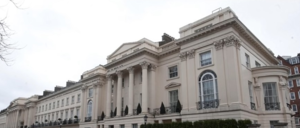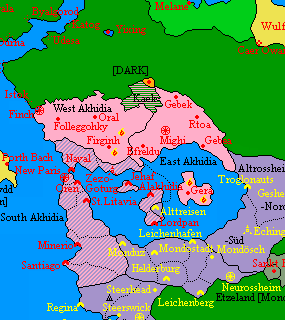1706 Akhidian Crisis
The 1706 Akhidian Crisis was a political conflict in the Kingdom of Akhidia.
Background
On the evening of 20.IX.1706 AN, King Edward of Akhidia went missing from his suite in Zremlan Palace following a private drinking party. News of his disappearance was immediately suppressed by palace authorities, in the hope that the 67-year-old monarch would eventually resurface, as had been the case in similar circumstances six years previously. Increasingly desperate attempts to contain the situation completely collapsed in early XI. 1706 AN, when leaked reports of the strongman monarch's mysterious absence hit the country's media; the resulting outpouring of popular speculation, accusations and counter-accusations lifted the lid on the barely suppressed personal and political tensions at the heart of the regime.
The crisis intensifies
The rising political tensions finally boiled over when Edward's sister, Princess Caryl, publicly blamed "elements close to the throne" of abducting or even murdering her brother. Although she declined to identify those she believed responsible, supporters of Edward were quick to accuse Queen Befra, wife of Edward's co-monarch Neil, of desiring to remove both Edward and King Matthew so as to ensure the uncontested succession of her newborn son, Prince Ivar. Although both Neil and Befra categorically denied any involvement in Edwards disappearance, the rumours refused to go away, as angry partisans of the three monarchs gathered outside public buildings in the major cities.
This growing power struggle at the heart of the Akhidian state emboldened other disaffected elements within wider society. The Fentoian ethnic group, long marginalised by the predominantly Batii elites, became increasingly restive, with Fentoian leaders openly calling for the abolition of the monarchy and Akhidia's restructuring as a federal state. On the island of Gera, terrorist organisation Al-Ramo took advantage of the chaos to renew its guerrilla campaign, swiftly isolating the provincial capital.
Flight of the kings
With the situation spiralling out of control and fearing repercussions from Edward's supporters, King Neil and Queen Befra fled New Paris on the night of 23.XI.1706 AN. Narrowly escaping the city, the pair, accompanied by Prince Ivar and a small cadre of senior staff, flew from Domansk Airport to Befra's hometown, the northern city of Finch. When news of the royal couple's flight broke the following morning, rioting mobs took to the streets as law and order broke down.
Similar scenes occurred in the eastern capital of Mighi, where a large mob stormed Zremlan Palace; trapped inside, King Matthew and Princess Caryl had to be smuggled out in disguise by their security personnel.
Mondo intervenes
The deteriorating situation in Akhidia was viewed with mounting concern by the government of the neighbouring Grand Duchy of Etzeland, who feared that the instability might destabilise the entire region if allowed to progress unchecked. Although appeals for Etzeland's absentee Grand Duke, Mondo, to respond to the developing crisis had hitherto proven unfruitful, the Drosselmeyer regime found a much more sympathetic ear in the person of Mondo's wife, Anastasia. The widow of the late King Ytro I and stepmother to Prince Şahangökbaharx, Anastasia had been exiled by King Edward in 1702 AN, but had continued to take an active interest in both her stepson and native land.
Another interested party was Mondo and Anastasia's daughter Lystasia. Half Akhidian by birth, the youthful but ambitious Grand Duchess of Steerswick saw in the unfolding crisis an opportunity to recover the former Steerish lands lost to Akhidia's dependency, Dunaria.
With his wife and daughter adding their voices to the increasingly insistent requests for intervention, Mondo was eventually persuaded to act, and on 8.XII.1706 AN, deployed the experimental airborne battleship Gravnought to New Paris. Transporting a battalion of cybernetically-enhanced soldiers, the gravship was ordered to rescue Prince Şahangökbaharx and reimpose order upon the city.
Lystasia intervenes too
Shortly after the Gravnought departed its base, Lystasia ordered her own troops into action. Having spent much of the preceding month conducting pacification operations in the newly-annexed region of West Steeria, Steerish forces were less than a hundred kilometres from the city of Regina, and later that day, a column of armoured grav vehicles from the Steerswick Guard Hussars crossed the border into Dunaria. Travelling west at high speed, the column reached the outskirts of Regina in the early hours of the following morning.
Occupation of New Paris
Gravnought arrived at New Paris on the night of 10-11.XII.1706 AN. After landing ground troops to secure Domansk and King Zezo Airports, the gravship positioned itself above the city centre, and shortly before dawn an assault force parachuted directly onto the building in which Prince Şahangökbaharx was believed to be present. Encountering negligible resistance, the special forces troopers swiftly secured the young prince before seizing control of the principle government departments and Ahidar chamber.
As news of the night's events spread, large crowds assembled in the streets the following morning. Although most were confused and afraid rather than belligerent, an aggressive minority attempted to incite a more violent response. Their efforts culminated in the attempt by a large but ill-disciplined mob to storm the defensive perimeter surrounding the government quarter later that morning, only to be dispersed by non-lethal munitions. Sporadic incidents continued to flare up periodically throughout the day and into the next, until Mondoist reinforcements airlifted into the two airports eventually advanced into the city to relieve the original assault force.
Protecting the Toy Museum
Having successfully secured New Paris, and with additional troops from across the Mondosphere arriving every day, Mondoist forces began to expand the area under their control. The initial objective was the nearby city of Oren, and a mechanised-cavalry column was rapidly ordered east. Mondo, however, had other ideas. Overruling the protests of his local commanders, the lich-adept demanded that priority be given to occupying Naval, on the far side of the Barbary Straits. Although Naval's location afforded the city an undoubted strategic value, Mondo's insistence owed more to his obsession with the famous local toy museum, which he believed to be at risk of looting.
Reluctantly bowing to their monarch's bizarre whim, Gravnought accordingly re-embarked its battalion and flew north across the straits.
A fourth king

The presence of Mondoist troops in southwestern Akhidia was, ironically, to encourage the very destabilising forces they had been sent to contain. The Tieyan-majority populations of Oren and Naval provinces had long been ambivalent subjects of the Akhidian realm, fearing the gradual diminution of their cultural identity in the face of a recent influx of Batii and Fentoian immigration into their traditional lands. Seeing the present crisis as an opportunity to reverse this trend, Tieyan leaders appealed directly to Mondo to annex the two provinces as a new state within the Mondosphere.
Mondo's response to the overture was lukewarm. Although expressing sympathy for the Tieyanese and promising to safeguard their homes, Mondo stressed that he had entered Akhidia as a concerned friend and not as a conqueror. There the matter may have ended, were it not for the personal intervention of Queen Anastasia. Allying herself with the Tieyans and other disaffected elements, the Queen immediately travelled to New Paris and quickly rallied those remaining Ahidar delegates hostile to King Edward. At her prompting, on 21.XII.1706 AN, this rump assembly proclaimed Prince Şahangökbaharx king, with the regnal name of Şahan I.
Zezo-Goturg declares for Anastasia
King Şahan's fortunes received a further boost when the strategic city of Zezo-Goturg, together with its powerful garrison, declared for his stepmother two days later. As a native of the city and only child of the former provincial governor, Anastasia had remained a popular figure and her exile by Edward had not been well-received by the local citizenry, who also resented the promotion of a Mighi native to the governorship by King Edward. With reports of Mondoist forces in Naval, conspirators in the garrison arrested the governor on the night of 22-23.XII.1706 AN and then seized control of the city.
The Divided Realm
At the beginning of XIV.1706 AN, Akhidia found itself with three competing governments. The alliance between King Matthew and the princesses Caryl and Lorena continued to preside over much of the kingdom's eastern heartlands from their temporary headquarters in Rtoa, although the former capital, Mighi, remained largely outside their effective control. King Neil and Queen Befra had established a rival regime in the city of Finch, from which they controlled the north-western provinces of Finch, Folleggohky and Oral. Lastly, the government of King Şahan was pre-eminent in the south west, protected by Mondoist garrisons in the major cities of Naval, Oral and Zezo-Goturg, as well as the capital, New Paris.
From deadlock to accommodation
By the final weeks of 1706 AN, it was becoming apparent that only one of the principle participants had the resources to reunite Akhidia: Mondo Etzeterra. However, the lich displayed no inclination to do so, often answering appeals for further intervention with the mantra Akhidia is not a Mondo Thing. Deprived of the unequivocal support of her husband, Queen Anastasia dared not risk attempting to dethrone the rival kings Neil and Matthew, while even united, the latter clearly lacked the might to defeat Şahan and his protectors.
Moreover, notwithstanding their personal rivalries, all three regimes had reasons to co-operate. Al-Ramo's rebellion continued to spread; most of the provinces of Gera and Firginh had been lost to the insurgents, while a third force of guerrillas was active in the interior of Jehaf Island. Ethnic strife between the Batii and Fentoians continued to disrupt much of the mainland, while even the major cities boiled with popular discontent as the crisis dragged on with no promise of imminent resolution.
Increasingly concerned by the situation, in early 1707 AN, Mondo personally invited the three kings to a summit at Ermingander Village, in the hope of arbitrating an accommodation. When, mistrusting Mondo’s motives, Kings Neil and Matthew both ignored the invitation, the normally genial lich became uncharacteristically angry and threatened to embargo all cake imports to Akhidia until the three monarchs agreed to send representatives. This appeared to have the desired effect, for after several days of prevarication, all parties eventually agreed to the summit; however, sources within Akhidia have since suggested that the kings’ volte-face owed rather more to the Mondoist cyberattack that paralysed the country’s communication networks for over twenty-four hours, rather than fears of widespread cake shortages.
The Ermingander Accords
The Ermingander Village Summit opened in II.1702 AN. At the opening session, the host stunned the various representatives with a far-reaching proposal to break the impasse and resolve the crisis. Mondo proposed that Akhidia be reconstructed as a confederation of three autonomous kingdoms: West Akhidia, under King Neil; East Akhidia, under King Matthew and Princess Lorena; and South Akhidia, under King Şahan, with Queen Anastasia acting as regent until the young monarch came of age. The three kingdoms would share a common currency and co-operate together in matters of common concern, such as combating the ongoing threat of Al-Ramo, but would otherwise retain sovereignty over their own affairs. Mondo also undertook to guarantee the rights of each king, and their heirs, within their own kingdoms.

In addition to the tripartite division of the realm, Mondo further proposed a series of territorial exchanges to consolidate Akhidia within more manageable borders. Under these plans, the sparsely populated and largely lawless far north would be abandoned, and territories of a comparable size reclaimed from the green to round out the country's core territories. Moreover, Etzeland would cede the recently-occupied Eisenfels district to South Akhidia, receiving instead the former Treisenberger capital of Alttreisen, while Steerswick would annex the Dunarian city of Regina, with its large ethnically-Steerish population. Mondo justified these last land exchanges on cultural-historical grounds, pointing out that the transfer of Eisenfels would allow for the reunification of Tieya's entire historical territory within South Akhidia.
Once the initial shock had subsided, it was clear that Mondo's proposals pleased no one. Even Mondo's own family were left dissatisfied; Anastasia's hopes of persuading her husband to impose her stepson as Akhidia's sole monarch appeared to have been dashed, while their daughter Lystasia, who had made no secret of her wish to annex Dunarian territory as far north as the key city of Santiago, was being offered less than half of what she had wanted. Mondo, however, remained unmoved by the storm of complaints and appeals. Reminding the attendees that a good compromise pleased nobody but was tolerable to everybody, the lich baldly announced his frustration with the continual bickering when there was more than enough cake for all. Mondo then announced that he was satisfied with the solution on the table and had other matters to attend to, namely the approaching senate election in Hurmu.
Although discussions continued in his absence for the rest of the week, it was soon apparent that Mondo's deal was the only deal in town. On 7.III.1707 AN, the Ermingander Accords- Mondo's plan with a few minor alterations- were finally signed.




